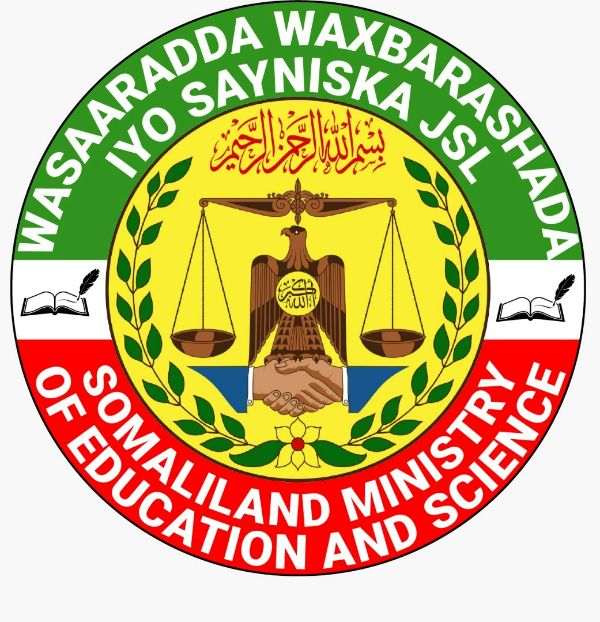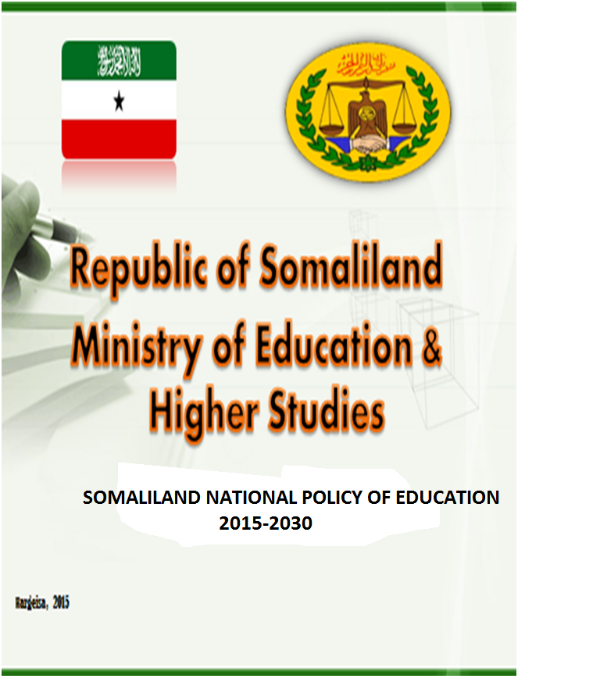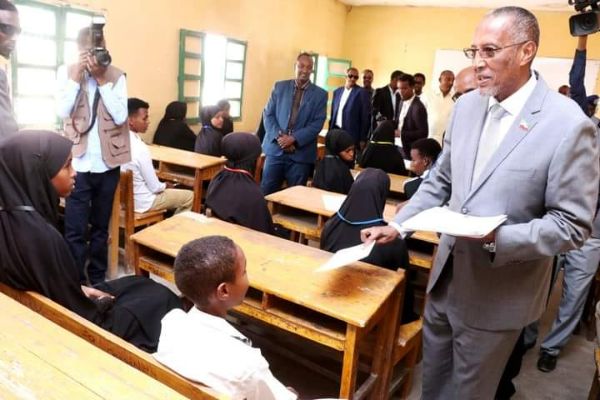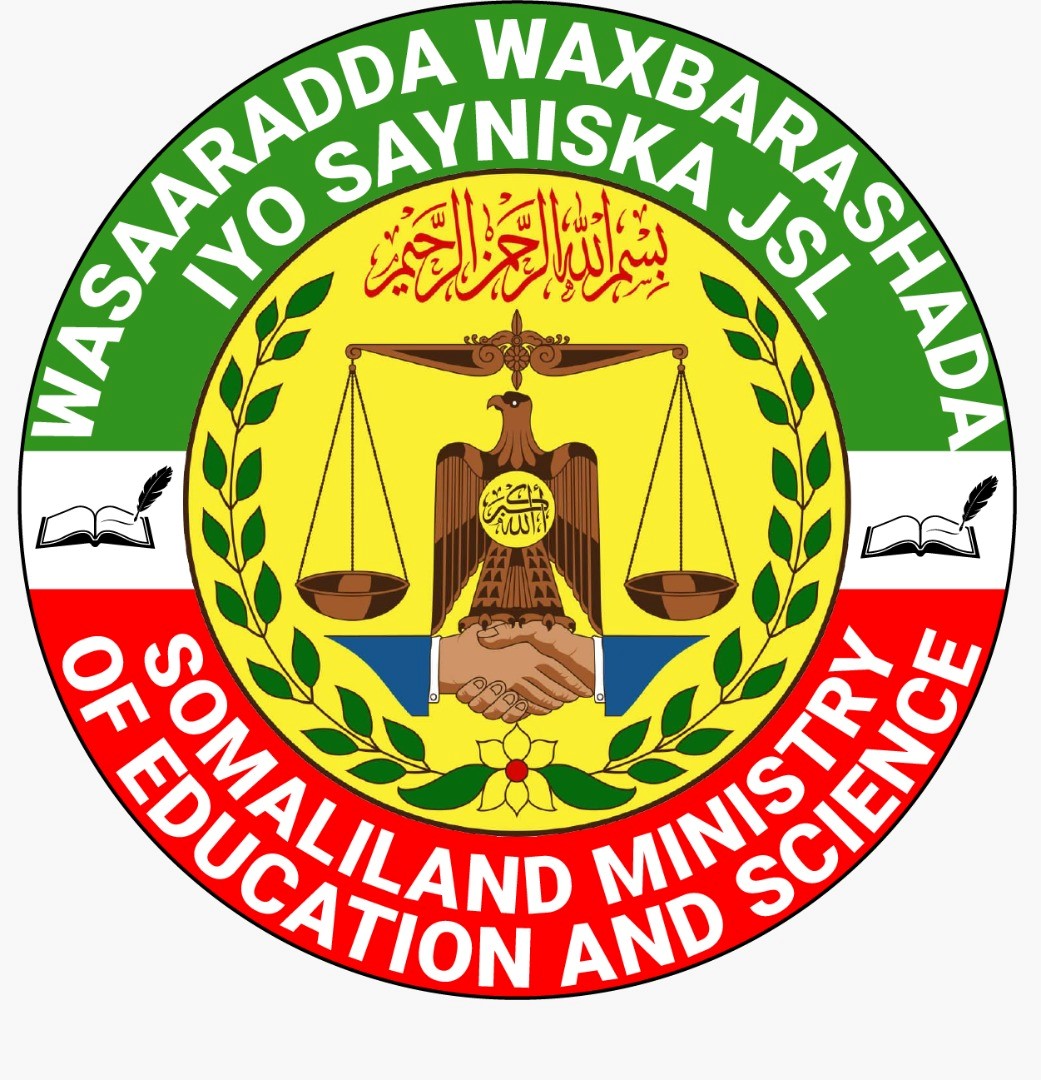GW4R_Projects-Documents
Teachers' Code of Conduct and Professional Ethics.

A code of conduct in this context is defined as the behaviour, attitudes, and character exhibited, for example, by anyone within and outside the working environment. The standards of conduct generally required of any member of the Somaliland Ministry of Education would be leadership, integrity, impartiality, fairness, and honesty in matters affected by work and the status of the teaching profession.
The code is classified into minor and serious/major misconducts. Also, penalties prescribed for various acts of misconduct are classified into minor or major penalties.
The misconducts reported by the target groups interviewed (children, teachers, H/teachers, parents/CEC, REOs/DEOs/Supervisors, elders and religious leaders, and Moe high-ranking officials) are divided into two categories:
- Serious misconduct
- Minor misconduct
Further details are available in an attachment below.
National Education polocy

Seeing the fact that education is change-driven and change-oriented as time goes by, the transformation has furnished the necessary improvement to the system, which is guided by national priorities and visions. In essence, the education policy is in essence planned to be a coherent and well-calibrated national policy.
Primary school enrolment has enormously multiplied while the enrolment of secondary schools has significantly increased.
with all activities existing inside and outside of education, the MOES developed policies to coordinate overall education activities.
Hargeysa-11/06/2022- Dhambaal Madaxweyne.

Madaxweynaha Jamhuuriyadda Somaliland, Mudane, Muuse Biixi Cabdi, waxa uu dhammbaal hambalyo iyo duco ah u dirayaa ardayda maanta u fadhiisatay imtixaanaadka shahaadiga ah oo guud ahaan gobolada iyo degmooyinka dalka si habsami leh looga wada fadhiistay fasallada siddeedaad ee dugsiyada dhexe iyo afraad ee dugsiyada sare ee dalka.
Imtixaanaadkan oo ay u fadhiisteen arday tiradoodu gaadhayso 40,000 (Afartan kun) oo arday, ayuu madaxweynuhu u diray dhammbaal hambalyo ah oo uu kula qaybsanayo farxada iyo rayn-raynta ay Ardaydaasi saaka ku galayaan imtixaanaadkaasi.
Sidoo kale madaxweynuhu waxa uu ardaydaa tirada badan oo ah markii u horaysay ee tiro intaa leegi ay u fadhiisato imtixaanaad shahaadi ah in Alle u fudaydiyo kuna guuleeyo geediga waxbarasho ee ay soo wadeen lana barbar-taagnaayeen waalidiintoodu.
Ugu danbayna waxa uu madaxweynuhu ardaydaasi u rajaynayaa inay guul ka gaadhaan mustaqbalkooda waxbarasho, dalkooda iyo dadkoodana ku anfacaan, halkaana ay ka sii wadaan hayaankooda waxbarasho.
ALLAA MAHAD LEH
Naasir Yuusuf Daahir
Agaasimaha Saxaafadda iyo Warbaahinta Madaxtooyada JSL.
REPUBLIC OF SOMALILAND MINISTRY OF EDUCATION AND HIGHER STUDIES Education Sector Strategic Plan (ESSP 2017-2021) October 2017
ESSPThis is the Second Education Sector Plan prepared by the government of Somaliland. Its preparation which was led by the Ministry and involved all stakeholders has created strong local ownership. It was designed taking into account the existing capacity in Somaliland. It has set its priorities using strategies that focus on activities that will expand access to good quality education in Somaliland on a sustainable basis.
This ESSP focuses on education outcomes for the sector and seeks to link accountability mechanisms to resources, so that those departments of education, are empowered, with clear roles and responsibilities. The Government of Somaliland is committed to provide quality, affordable and competitive education to its citizens, and to reduce barriers, and ensure equitable access and learning outcomes with very ambitious, but achievable targets. The support of all donors and international development actors, and their alignment behind the ESSP processes and policies described in this document, will be critical to the overall success and sustainability of the ESSP.
ACHIEVEMENTS OF THE MINISTRY OF EDUCATION AND SCIENCE by 2020
During the Year Ended 31.12.2020During 2020, the world has experienced an unprecedented level of disruption caused by the coronavirus pandemic, which slowed down the operations of every business institution whether public or private. Despite that, the MoES succeeded to achieve tangible results in regard to contributing to the three development priorities prescribed by the Education Sector Strategic Plan (2017-2021) namely, increasing educational accessibility while maintaining equity and equality, enhancing the educational quality, and strengthening educational governance. In addition, the Ministry successfully coped with the disruptions of the coronavirus on education by ensuring the continuity of education for the majority of students during the school closure.
This document briefly presents an informative account of the activities accomplished during 2020. It explicitly indicates the strategic reform made by the Ministry in consideration of satisfying both the existing local demand and international best practices. Effective, transparent, and inclusive public institutions are fundamental to achieving Sustainable Development Goals, which was one of the prime objectives of initiating the strategic reform. The main focus of the reform was to improve the governance and operational capacity of the Ministry in order to achieve successfully the three priorities mentioned above.
The intention of institutional restructuring and functional review, which resulted from the reduction of the number of departments of the Ministry from 24 to 15, was to establish a more efficient structure, effective processes, and engaged staff. Hence, eliminating unnecessary duplication of efforts within functions of departments augments efficiency. Similarly, removing unwanted layers of management structure through delegation of responsibilities improves operational and decision-making processes of the Ministry. The change management accompanied with the institutional restructuring and functional review aims to improve internal systems of the organization, enhance efficiency, and boost staff performance.
The document briefly outlines the barriers to access education and presents the main tasks the Ministry implemented in order to improve access to education. Generally, constructions of new schools in areas where schools are not readily available, as well as the extension of classes, are, among others, the main development interventions aimed to improve access to education and/or sustain retention. The approach of the Ministry in constructing new schools to improve access is based on rational analysis of facts available rather than on an impulse. The Ministry utilized the number of settlements in the country that totals 1510 of which 662 have no schools. The settlements were organized into manageable groups of 10 educational zones in order to identify gaps. Currently, most of the new schools constructed, during 2020 and early 2021, are built-in settlements that had no previous education facilities at all, thus improving access to education.
One of the most important interventions in terms of enhancing educational quality standards is to develop and employ well-trained and qualified teachers. Fortunately, the Ministry has a National Teachers Training College that is designed to mold the kind of teachers that could contribute to the quality of education in schools. The Ministry has, during the period,
SL MOES Response To COVID-19 pandemic
COVID-19 Preparedness and Response Plan March 2020--June 2021
In late 2019, an acute respiratory disease, known as COVID-19, emerged. The World Health Organization (WHO) declared the outbreak as a global pandemic and as of 28th March, more than 600,000 cases and 10,496 deaths were reported worldwide. As a result of the escalating situation around COVID-19, The world is facing an unprecedented crisis due to the ongoing Covid-19 global pandemic. The disease is caused by severe acute respiratory syndrome coronavirus 2 (SARS-CoV-2)1 and was recognized as a pandemic by the World Health Organization (WHO) on 11 March 2020. An increasing number of cases of this highlights the need for swift and comprehensive response in order to reduce disruptions to learning in Somaliland and to protect the most marginalized children from severe impacts.

